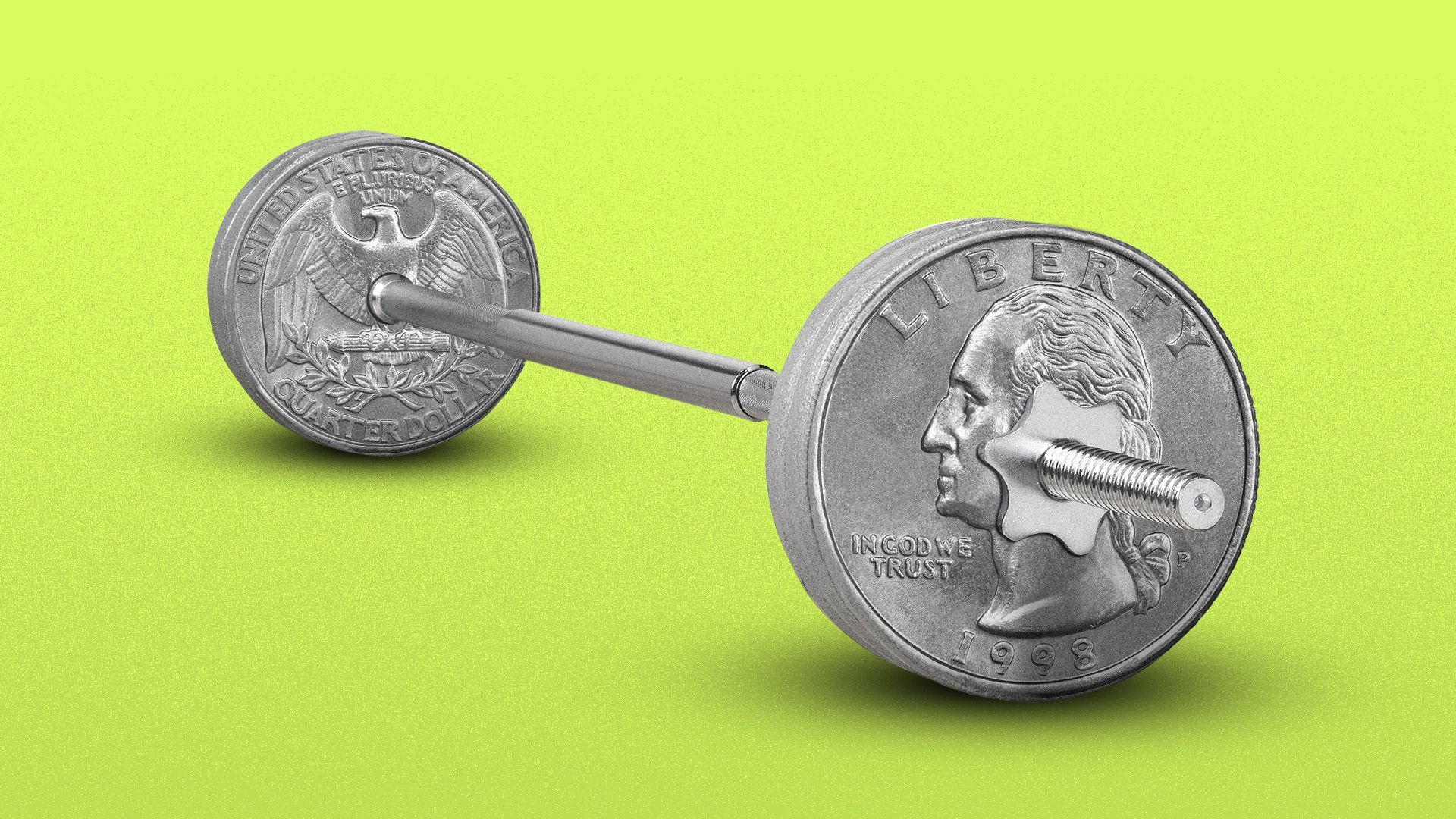| | | | | | | | | | | Axios Markets | | By Matt Phillips and Emily Peck · Aug 15, 2022 | | Good morning, Markets folks. We're back — and we missed you last week! 🚨 ICYMI: Big news! Axios will become part of Cox Enterprises after agreeing to be sold for $525 million. Importantly ... our coverage won't change, dear readers! Let's get on with this Monday morning. Today's newsletter is 1,145 words, 4.5 minutes. | | | | | | 1 big thing: Afghanistan's economic calamity |  | | | Photo illustration: Aïda Amer/Axios. Photo: Lillian Suwanrumpha/AFP via Getty Images | | | | One year after the U.S. withdrew from Afghanistan, the country's economy has — as predicted — imploded, exacerbating an already-existing humanitarian crisis, Axios' Felix Salmon writes. Why it matters: Afghanistan entered 2021 as a client state of the U.S., reliant on foreign aid for 75% of public spending. When President Biden made the decision to withdraw, that grant funding disappeared, and some $9 billion of Afghan central bank assets were frozen, rendering many normal central bank functions impossible. - On top of that, sanctions on money flows to anybody associated with the Taliban have had a chilling effect more broadly, with many foreign banks being "unwilling to process foreign currency transactions involving Afghan banks," per Human Rights Watch.
By the numbers: The Afghan government's 2022 budget is down more than 60% from its 2020 level in nominal terms and much more in real terms. Basic household goods inflation is running at 52% year-on-year. Per capita income is now about $375 per year, its lowest level in over a decade. What they're saying: "This is a form of collective punishment," Mark Weisbrot, co-director of the Center for Economic and Policy Research, tells Axios. "If there was a war going on, it would be a war crime under the Geneva Conventions." - Article 33 prohibits "collective penalties" in war, saying "no protected person may be punished for an offence he or she has not personally committed." U.S. actions against the central bank have had punishing effects on all Afghans.
Where it stands: After an initial plunge, Afghanistan's economy and currency seem to have stabilized somewhat at their new lower level. Exports are even rising, thanks to higher energy prices — the country's coal exports are up significantly, partly thanks to child labor. The bottom line: There is no evidence that the Taliban regime has the ability or inclination to rule Afghanistan effectively, even without international sanctions. - But as the International Rescue Committee says, "Afghanistan's slide towards catastrophe is primarily driven by the policies of the international community, rather than conflict or natural disaster."
Go deeper: Felix wrote on Saturday about the U.S. confiscation of Afghanistan's central bank reserves. |     | | | | | | 2. Catch up quick | | 🇨🇳 China's latest economic data shows further slowdown, prompting surprise rate cut. (WSJ) 🏦 Wall Street reopens Russian bond trading, to help investors exit positions. (Reuters) ⚜️ The story behind the conviction of the world's most powerful gold trader. (Bloomberg) |     | | | | | | 3. Deal mania |  Note: M&A data excludes SPAC mergers; Data: Dealogic; Chart: Jacque Schrag/Axios The great deal-making frenzy is over — or is it? The big picture: It depends on how you look at it. Corporate M&A and private equity acquisitions have kind of fallen off a cliff this year, Axios' Kate Marino writes. - Yes but: For all the uncertainty permeating the markets — not to mention it's more expensive to fund deals — deal activity is still heading for one of the busiest years on record (though it just won't top 2021).
State of play: A tremendous amount of uncertainty has entered the market this year — the war in Ukraine, sky-rocketing energy prices, and of course, recession risk. - "In situations of economic uncertainty, the ability to reach an agreement between a buyer and seller about what something will be worth in the future goes down," Christian Correa, president and CIO of Franklin Mutual Series, tells Axios.
And deal activity has gone down since last year — just check out the chart above. But, but, but: Precarious times offer opportunities of their own. - "The conversation now is largely around how to take advantage of the situation that is being presented by turbulent markets, and a world where the footing doesn't feel quite as stable as it has been historically," says David Harding, an advisory partner at Bain & Company.
- Another strategic shift: "Pre-COVID, everything was about finding the next disruption," and acquiring new business lines, he says. "But we've seen a shift back to more scale-oriented [consolidation] deals."
The bottom line: Despite all the uncertainty, Bain still forecasts that globally, 2022 will be the second largest year for M&A on record. |     | | | | | | A message from Axios | | Get $200 off Axios Pro: Deals | | |  | | | | If you've been curious about Axios Pro, there's never been a better time to subscribe. Why it matters: Inflation, international conflicts and a looming recession all make H2 difficult to forecast. Axios Pro is here to help. Use code PRO200 at checkout to get $200 off your subscription. | | | | | | 4. Bucking the trend |  Data: Leveraged Commentary & Data, Refinitiv LPC; Chart: Axios Visuals One area that hasn't seen a steep year-over-year drop-off: direct lending deals, Kate writes. Why it matters: Direct lenders are increasingly muscling in on the loan-making that fuels M&A and private equity buyouts — an area long dominated by banks. State of play: Direct lending is part of the relatively new private debt market that's become a force just in the last decade (Bloomberg has a great explainer). - Direct lenders are often arms of asset managers. They hold onto loans to collect interest, whereas investment banks typically "syndicate" loans — selling them off in pieces to investors across Wall Street while pocketing a fee.
- Heavyweights in the private markets, like Apollo, Blackstone and Ares, have all raised their own direct lending funds.
By the numbers: Leveraged bank loan deals completed in the first half of 2022 were a whopping 49% lower than those in the first half of last year. - Direct lenders, on the other hand, completed 22% more in the first six months of 2022 (after an unusually busy Q4 2021).
|     | | |  | | | | If you like this newsletter, your friends may, too! Refer your friends and get free Axios swag when they sign up. | | | | | | | | 5. Private market muscle |  | | | Illustration: Aïda Amer/Axios | | | | Private equity buyouts might have faced an even steeper decline this year if not for the private debt market, Kate writes. - "Private debt and direct lending absolutely play a meaningful role today in the buyout deal space," says Brenda Rainey, executive VP of Bain & Co.'s global private equity practice.
The big picture: When interest rates rose rapidly at the beginning of the year, some investment banks were caught holding commitments for buyout loans that were suddenly not priced at prevailing rates. - As a result, they were difficult or impossible to place with investors without taking steep losses.
- That's causing something of a traffic jam in banks' lending pipelines (more from the FT).
Enter the direct lenders ... Even before the pandemic, private debt funds had been migrating into increasingly larger deals. And in today's tumultuous environment, they're one more pocket of funding that PE firms can turn to for deal financing when capital from banks is flowing less freely. How it's playing: Prominent PE firm Vista Equity's biggest deals this year tell the story. - The debt financing for its $16.5 billion purchase of cloud software company Citrix was announced back in January with a Bank of America-led group of banks. Yet the debt still hasn't been placed with investors — and is one of the largest albatrosses on bank balance sheets, sources tell Axios.
- Fast forward: Vista's latest deal, the $8.5 billion buyout of tax software maker Avalara announced last week, already has a group of private lenders providing a $2.5 billion loan, a source familiar tells Axios (the private loan was first reported by Bloomberg).
The bottom line: Turns out it might be easier to get a loan deal done when you don't have to convince hundreds of other firms to join you. |     | | | | | | A message from Axios | | Get $200 off Axios Pro: Deals | | |  | | | | If you've been curious about Axios Pro, there's never been a better time to subscribe. Why it matters: Inflation, international conflicts and a looming recession all make H2 difficult to forecast. Axios Pro is here to help. Use code PRO200 at checkout to get $200 off your subscription. | | | | ✨ Thanks, Mickey Meece, for copy editing Markets today, and every day. |  | | Why stop here? Let's go Pro. | | | | | | Axios thanks our partners for supporting our newsletters. If you're interested in advertising, learn more here.
Sponsorship has no influence on editorial content. Axios, 3100 Clarendon Blvd, Arlington VA 22201 | | | You received this email because you signed up for newsletters from Axios.
Change your preferences or unsubscribe here. | | | Was this email forwarded to you?
Sign up now to get Axios in your inbox. | | | | Follow Axios on social media:    | | | | | |











No comments:
Post a Comment